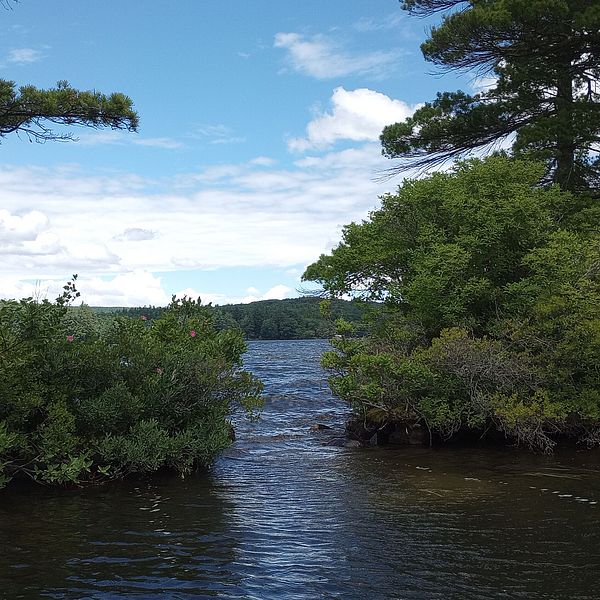by Janine Marr
This is a busy summer for the Land Management & Recreation department of the MC! Christian Carson, our Antioch student intern, has been busy assessing our public trails for needed maintenance. You may notice changes at the Calhoun Family Forest, where volunteers helped reroute trail sections around wet areas and added a new spur trail to the top of Porcupine Falls.
Work continues on other trails this summer. Invasive buckthorn, honeysuckle, and Japanese knotweed are being removed from the boardwalk and parking areas at the Cranberry Meadow Pond Trail in Peterborough. On July 20th, volunteers will create a short reroute around a wet area on the Cunningham Pond Trail in Peterborough.
We also partnered with Camp Waklo in Jaffrey this month to manage two popular destinations: Whittemore Island on Thorndike Pond and the Gramwick Trail at Mountain Brook Reservoir. On Whittemore Island, several campers helped trim vegetation on the loop trail and remove hundreds of young buckthorn plants. The western side of the island was carpeted in partridgeberry, lady’s slipper orchids, trillium, mosses, blueberry bushes, cucumber root, and other native wildflowers. We also found evidence of a beaver harvesting serviceberry trees. On the Gramwick Trail, the volunteers rerouted the trail around a vernal pool and removed invasive species, including buckthorn, multiflora rose, and Japanese barberry.
On July 25th, our Maynard Forest in Gilsum will play host to a portion of the Climate Resilient Forest Management tour in southern New Hampshire. The Conservancy's Alex Metzger, Richard Pendleton, Christian Carson, and Janine Marr will guide the group through some of the property's experimental forest openings created in 2010, part of a timber harvest and research study that focused on reducing American beech regeneration, increasing red oak regeneration, and reestablishing American chestnut trees. Participants will view areas that were cut and left to regenerate naturally, areas that were fenced to exclude deer (which love to eat red oak seedlings), and areas that were treated mechanically and chemically to discourage beech growth. In addition, the group will visit a plot where hybrid American chestnuts were planted to assess their adaptation to the changing climate and their resilience to the chestnut blight that decimated the species in the early 20th century.
Work has begun on the Devan Preserve in Marlborough that was severely impacted by a hemlock looper caterpillar infestation a couple of years ago. A high percentage of the Eastern hemlocks trees were killed, which reduced the quality of deer habitat in the Preserve. Out of concern for fire risk, and for the lack of cover and wildlife habitat that hemlock provides, we contracted with a forester to remove the dead trees in a few stands that were hardest hit. We will utilize different types of tree harvesting practices across approximately 125 acres to maximize the regeneration of species desirable to wildlife and to jump-start the regrowth of the forest. Work begins this month and will continue through the fall, and we're planning a public tour of the active harvest in August.
